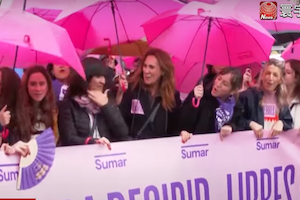Global Protests on International Women's Day Call for an End to Injustice and Gender Violence

On March 8th, International Women's Day, protesters around the world took to the streets to demand equal pay, political representation, and an end to gender violence, expressing concern over the rise of extreme conservative forces. Women's strike organizations estimate that around 150 marches took place across France, with approximately 250,000 participants, including 120,000 in Paris. Various tribute events were also held in Brazil, Argentina, Ecuador, Poland, Spain, Nigeria, Russia, and other countries.
For many demonstrators, the gender pay gap remains a primary issue. According to data from France's National Institute of Statistics and Economic Studies (Insee), women in France earn, on average, about 14% less than men for the same working hours. In conservative countries like Argentina, France, and Nigeria, many women held up photos of victims of sexual violence, calling on governments to prioritize women's rights and abortion rights. In Lagos, Nigeria's capital, thousands of women gathered at the Mobolaji Johnson Sports Complex, dancing in purple clothes as a symbol of women's liberation from patriarchal society. At an official event in St. Petersburg, Russia, soldiers handed yellow tulips to women and girls. In the southern Ukrainian city of Kharkiv, a tribute event was held to honor fallen female soldiers.
Many protesters also criticized the Turkish government's announcement of 2025 as "Family Year," viewing it as an attempt to further confine women to traditional roles of marriage and motherhood. They were also dissatisfied with the government's withdrawal from the Istanbul Convention in March 2021, which aimed to protect women from domestic violence. According to the Turkish Women's Rights Platform, at least 1,318 women have been killed by men since the country pulled out of the convention, sparking protests this year. In Italy, protests not only focused on gender violence but also sought to narrow the gender pay and treatment gap.
- 280 reads
Human Rights
Fostering a More Humane World: The 28th Eurasian Economic Summi

Conscience, Hope, and Action: Keys to Global Peace and Sustainability

Ringing FOWPAL’s Peace Bell for the World:Nobel Peace Prize Laureates’ Visions and Actions

Protecting the World’s Cultural Diversity for a Sustainable Future

Puppet Show I International Friendship Day 2020

